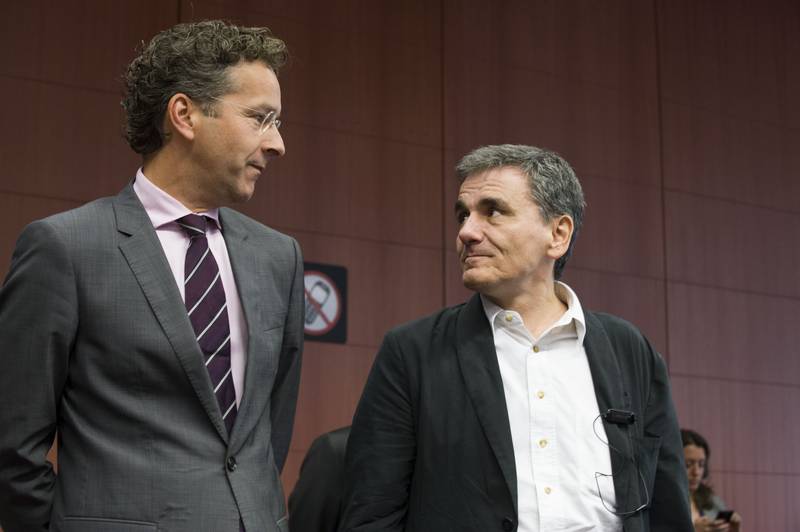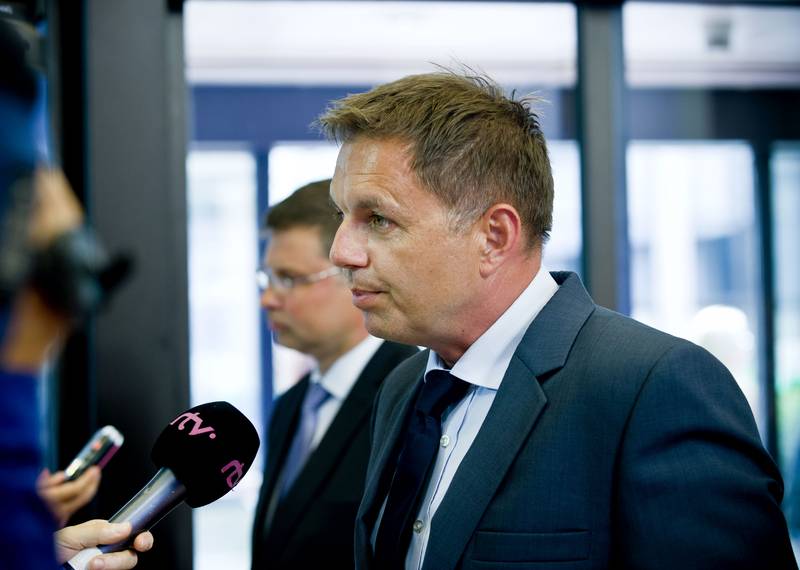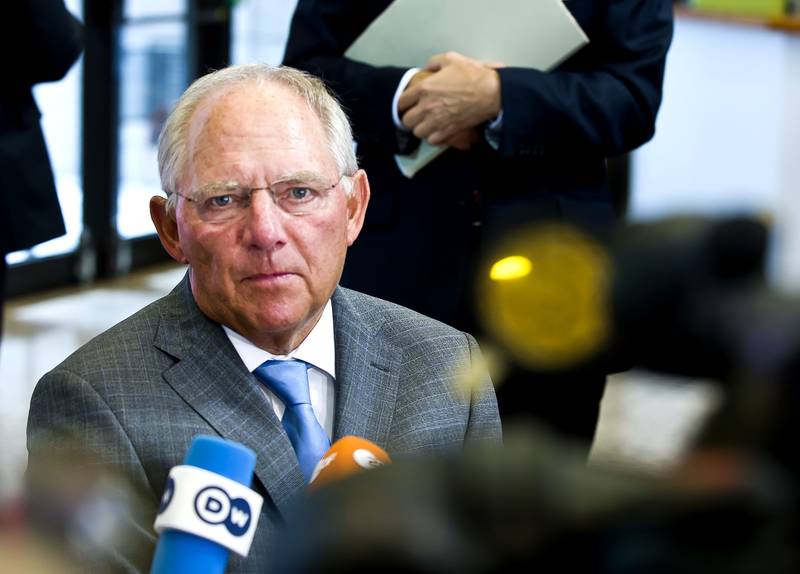Greece's Third Bailout Deal Fell in the Eye of the Currency Storm
Adelina Marini, August 14, 2015
 Can you imagine that the main topic of the emergency meeting of the Eurogroup on Greece is not Greece itself? Difficult to do, but fact. The third bailout package of loans-against-reforms, which has already been agreed on and is about to be approved by the finance ministers of member-countries of the currency club today, fell victim to the global currency storm. The main subject of the Friday meeting is not what exactly should the adjustment programme for Greece contain – something more or less agreed on, save for a few details of less than fatal character. The main topic is whether the International Monetary Fund (IMF) will participate in it. The conflict between the EU and the IMF has been brewing for a long time, but has now turned into a serious obstacle to signing the third programme. The issue is that the IMF has began a few months ago to insist on a relief on the Greek debt, currently held mainly by public creditors – states and international organisations. Many in the Eurozone, however, headed by Germany and Finland, are emphatically against any debt cancellation.
Can you imagine that the main topic of the emergency meeting of the Eurogroup on Greece is not Greece itself? Difficult to do, but fact. The third bailout package of loans-against-reforms, which has already been agreed on and is about to be approved by the finance ministers of member-countries of the currency club today, fell victim to the global currency storm. The main subject of the Friday meeting is not what exactly should the adjustment programme for Greece contain – something more or less agreed on, save for a few details of less than fatal character. The main topic is whether the International Monetary Fund (IMF) will participate in it. The conflict between the EU and the IMF has been brewing for a long time, but has now turned into a serious obstacle to signing the third programme. The issue is that the IMF has began a few months ago to insist on a relief on the Greek debt, currently held mainly by public creditors – states and international organisations. Many in the Eurozone, however, headed by Germany and Finland, are emphatically against any debt cancellation.
Tonight, while the Greek parliament debated hotly the content of the next bailout programme, the IMF came out with a statement after the conclusion of the Fund special mission in Athens, led by Delia Velculescu. It says in it that the IMF remains closely engaged with the Greek government and the European partners and will decide whether to participate in providing financing. The decision depends on whether any action toward further Greek debt relief is taken. Most monetary union member countries are expressly against this. Eurogroup boss Jeroen Dijsselbloem admitted before the start of the meeting this afternoon that the debt problem is really huge. This issue will have to be decided in October at the earliest, when the report on the stability of the Greek debt should be ready.
Finnish Minister of Finance Alexander Stubb described the situation as Catch 22. “IMF would be involved only with debt relief and we want the IMF to be involved and we don't want a debt relief”, he said. Stubb and other ministers declared they were willing to accept some debt relief, however not as an amount but as maturities. Mr Stubb sees a possible relief first in the form of changing payment dates, then as a new lowering of interest rates and only then a third step could be considered. First of all, however, IMF participation should be guaranteed. If the Fund refuses to participate, then there will be no third bailout programme but a new bridge financing, snapped German Minister of Finance Wolfgang Schäuble.
 Slovak finance minister Peter Kažimír said that a possible restructuring of the debt could be perceived as a reward for fulfilling the programme, but not as a preliminary condition. His Maltese colleague Edward Scicluna also admitted that at this stage there could be no talk of trimming the debt. Many of the ministers do not expect the meeting to be brief, but none of them expects the programme to create trouble. Some see political risks. Alexander Stubb hinted that the political situation in Greece may turn into a problem. Of this also spoke his Slovak colleague. According to Peter Kažimír, the most important part of the programme is its “ownership”. There is already talk of elections again. We should remember that the third bailout programme was derailed exactly by campaigning last year, reminded Mr Kažimír. Greek Prime Minister Alexis Tsipras, who is losing more and more support within his own party, has been talking of preliminary elections.
Slovak finance minister Peter Kažimír said that a possible restructuring of the debt could be perceived as a reward for fulfilling the programme, but not as a preliminary condition. His Maltese colleague Edward Scicluna also admitted that at this stage there could be no talk of trimming the debt. Many of the ministers do not expect the meeting to be brief, but none of them expects the programme to create trouble. Some see political risks. Alexander Stubb hinted that the political situation in Greece may turn into a problem. Of this also spoke his Slovak colleague. According to Peter Kažimír, the most important part of the programme is its “ownership”. There is already talk of elections again. We should remember that the third bailout programme was derailed exactly by campaigning last year, reminded Mr Kažimír. Greek Prime Minister Alexis Tsipras, who is losing more and more support within his own party, has been talking of preliminary elections.
The IMF sets debt relief as an ultimatum, because the Fund seriously damaged its image by its participation in the bailout operations in Europe, especially in Greece. The problem, however, is not so much the Fund's image, but rather its survival after it became evident that there is about to be born a competition to it in the image of the Asian Infrastructure Investment Bank (AIIB), which represents itself as a competitor to the Bretton Woods institutions – the IMF and the World Bank. In an article for the American foreign policy magazine The Foreign Affairs Rebecca Liao writes that the creation of the AIIB means that the IMF and the World Bank – the two dominating players in the lending for development and international financial regulation – now have an Asian colleague. Most importantly, she writes, this bank will release funds without preconditions.
The initiative for the bank’s creation is of the Chinese government and already almost 40 countries of the region have declared their support, as well as 20 outside the region, European governments among them. Important factors at the moment are also the currency attacks, organised by the Chinese government with the Chinese national bank devaluing the Yuan twice over just a week. This shows the second largest world economy is hard set on playing by different rules. In these circumstances the Eurozone fell into the eye of the storm. The economic and monetary union of the EU is concerned only with the interests of the Euro and the narrow national interests of each individual member, while the IMF boss Christine Lagarde needs to balance between the interests of all over a hundred members, among which are China, USA, and Russia. Moreover, the former Minister of Finance of France is running for a second term as Managing Director of the IMF, which will most likely be marked with the question of the Fund’s survival.
 The request for debt relief before Greece has shown its ability to follow the programme would be catastrophic and demoralising to the Eurozone. This is the third bailout programme in a row with neither the first, nor the second showing any success. Not so much because they were not good, but because of bad implementation and lack of faith in their significance within Greece itself – the so named “ownership”. Writing off debt will first of all demoralise the rest of the countries with large public debt and later create even larger problems in the countries with good fiscal discipline, who would serve as donors. Such a move would be just grist to the mill of anti-European parties at a time, when European solidarity is much needed at another battle – the one with migration.
The request for debt relief before Greece has shown its ability to follow the programme would be catastrophic and demoralising to the Eurozone. This is the third bailout programme in a row with neither the first, nor the second showing any success. Not so much because they were not good, but because of bad implementation and lack of faith in their significance within Greece itself – the so named “ownership”. Writing off debt will first of all demoralise the rest of the countries with large public debt and later create even larger problems in the countries with good fiscal discipline, who would serve as donors. Such a move would be just grist to the mill of anti-European parties at a time, when European solidarity is much needed at another battle – the one with migration.
Translated by Stanimir Stoev
 Klaus Regling | © Council of the EU
Klaus Regling | © Council of the EU Mario Centeno | © Council of the EU
Mario Centeno | © Council of the EU Mario Centeno | © Council of the EU
Mario Centeno | © Council of the EU